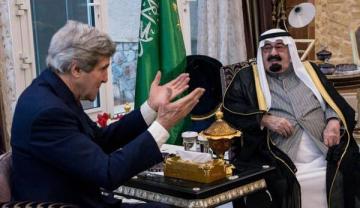
King Abdullah of Saudi Arabia, 90 years old, died Friday and was buried just after Friday prayers. His half-brother Salman, 79 years old, succeeded him on the throne. The principal leaders of the world, among them François Hollande and Barack Obama, paid tribute to King Abdullah, hailing him as a supporter of peace in the Middle East, a value that still has no place in the Saudi kingdom, where human rights are often violated.
Rich in petrodollars, Saudi Arabia benefits from a certain Western complicity concerning its human rights violations. Lack of liberty and democracy, decapitations, stoning and flogging, the Saudi model is one of the most backward in the world. However, the kingdom has never been disturbed or held accountable by its Western allies, unlike its Syrian and Iranian neighbors, who are violently criticized for their handling of human rights.
Complaisance in regards to this monarchy is justified by an alliance that is not only strategic, but also economic and commercial. All this began in February 1945, when Americans and Saudis signed the famous Quincy Accord: oil versus protection.
Seventy years later, this pact is still in force, and Riyadh remains one of Washington’s two principal allies in the region. This laxity of the U.S. toward its Middle Eastern partner rings false in light of the fight against terrorism and the defense of human rights, which are still the trademarks of U.S. foreign policy. The same goes for most Western countries, which make it a point of honor to maintain special relations with Saudi Arabia, at the expense of the principles they defend. Even so, the Western world — Obama, Merkel, Hollande, etc. — unanimously praised Abdullah’s “commitment” to peace, completely overlooking the total absence of democracy and individual liberties in that kingdom.
Blogger Badawi Sentenced to 1,000 Lashes
Raif Badawi received 50 lashes on Jan. 9, before a crowd in front of a mosque in Jeddah. These were the first of the 1,000 lashes to which he was sentenced, in addition to a sentence of 10 years in prison for establishing a reformist website and for allegedly insulting religious authorities.
The accusations directed at Badawi are based solely on the peaceful exercise of his right to free speech, explained Human Rights Watch. In 2008, Badawi created an online discussion forum to encourage debate on religious and political issues in Saudi Arabia. The blogger has been detained in Briman prison in Jeddah since his arrest on June 17, 2012.
“Corporal punishment is nothing new in Saudi Arabia, but publicly lashing a peaceful activist merely for expressing his ideas sends an ugly message of intolerance,” stated Sarah Leah Whitson, Middle East and North Africa director at Human Rights Watch.
In July 2013, the criminal court in Jeddah first sentenced Badawi to seven years in prison and 600 lashes, but in May 2014, a court of appeals increased his sentence to 10 years in prison and 1,000 lashes. The ruling stated that the 1,000 lashes should be distributed in 20 sessions of 50 lashes each in front of al-Jafali Mosque, with at least a week between each session.
International human rights law prohibits judicial verdicts that impose corporal punishment as torture, including flogging, insisted Human Rights Watch. Furthermore, Saudi Arabia ratified the Convention against Torture and Other Cruel, Inhuman or Degrading Treatment or Punishment in 1997.

As a citizen of the United States I am appalled by our officially friendly relation with this atrocious country. We fawn on tyrants wherever it is convenient for our ruling class. Contrast this GOOD NEIGHBOR POLICY with Saudi Arabia and our government’s implacable-until now-hostility to poor socialist heroic, still revolutionary Cuba.
President Obama should have worn an ” I am Charlie ” button to King Abdullah’s funeral.
( http://radicalrons.blogspot.com/ )